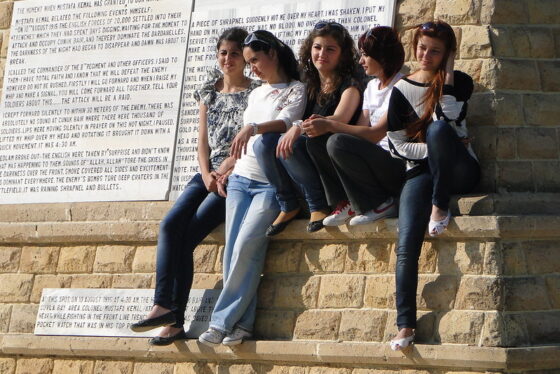After 20 years in power, Turkey’s Justice and Development Party (AKP) is struggling to connect with young voters ahead of elections next year, including President Recep Tayyip Erdogan’s bid for another term.
“I hope the country changes with the upcoming elections,” said Orhan, a high-school student in Istanbul. He will be eligible to vote for the first time in the next presidential and general elections, expected to be held around June.
Orhan said he dreams of becoming a pilot.
“I’ll consider moving to Europe if things remain the way they are,” he said.
Turkey last voted for parliament and president in 2018. Around 6 million of the country’s 85 million people will be eligible to vote for the first time in 2023.
Younger voters did not experience Turkey’s meteoric growth during the AKP’s initial years in power. Their frustration has grown as inflation tops 80%.
In a November poll by think tank Istanbul Economics Research, 58% of respondents ages 18-24 said they were anxious about the country’s future — more than in any other age group. This cohort also was least likely to feel “hope” or “pride” for Turkey, at 18% and 9%, respectively. Turkish President Recep Tayyip Erdogan listens to young people at a town hall meeting organized by his Justice and Development Party. © Anadolu Agency
Turkish President Recep Tayyip Erdogan listens to young people at a town hall meeting organized by his Justice and Development Party. © Anadolu Agency
The same poll found that 31% of all respondents planned to vote for the ruling coalition, a higher figure than seen during the summer. No age-based breakdown was provided.
But support for the opposition came in at 30%, and younger voters may sway the results.
Under the AKP, Turkey’s gross domestic product per capita more than tripled in 10 years to around $12,000 in 2013. New airports and universities were built across the country, and access to health care greatly improved.
But per-capita GDP has fallen below $10,000 in recent years.

Democracy is also in retreat. Turkey’s score in the Economist Intelligence Unit’s Democracy Index has been declining since around 2013.
The AKP initially helped instill Western liberalism and advance democracy in Turkey. Prior to the party’s rise, the country had experienced a series of coups by its powerful military, which saw itself as the protector of Turkish secularism. Devout Muslims, who make up the majority of the population, were oppressed, and the AKP — which had Islamist roots — was deemed unconstitutional at one point.
But now the AKP itself is clamping down on free speech. The party is believed to control 80% to 90% of key Turkish media outlets. It also has increased its grip over social media in recent years, and merely retweeting posts deemed a threat to national security has become a crime.
A coalition of six opposition parties — which includes former Prime Minister Ahmet Davutoglu and former Deputy Prime Minister Ali Babacan, both former AKP members — published a draft for a new constitution on Nov. 28.
Accompanied by the slogan, “Now is the time for democracy,” the proposal would terminate the president’s affiliation with any political party, strengthen parliamentary authority and focus on protecting human rights.
Next year also marks the centennial of the modern Turkish republic. The opposition has struggled to unite behind a single presidential candidate in the past. But it is expected to rally behind the draft constitution this time to present an alternative path forward for Turkey.
Source: Nikkei Asia



